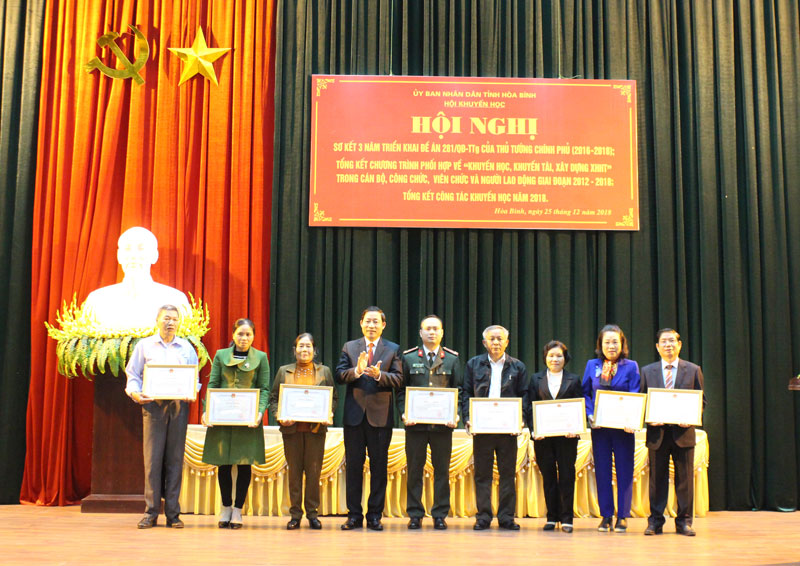
(HBO) – The Hoa Binh Learning Promotion Association recently held a conference to review the 3-year implementation of Project 281/QD-TTg of the Prime Minister on promoting the lifelong learning in families, clans and communities from 2016 – 2018.
The event also reviewed results of
the programme to promote education, talents and a learning society among administration
officials in the province from 2012 – 2018 and of the local learning promotion
works this year.
Present at the conference were
Vice Chairman of the provincial People’s Committee Bui Van Cuu, leaders of the
Vietnam Learning Promotion Association and the Vietnam General Confederation of
Labour.
Under the project, the province
has seen notable progress in the quantity and quality of its learning models.
This year, there are close to 125,000 learning families, 914 clans, over 1,200
village-based communities and 562 units across the province. These models have
helped improve people’s educational background and human resources training to
boost socio-economic development.
Over the past five years, all
administration officials at the provincial and district levels have received further
training to meet new standards; over 90 percent of workers at local industrial
parks are high school graduates or have obtained equivalent diplomas; about 40
percent of civil servants have attained Grade-2 foreign language proficiency
degrees and 20 percent have Grade-3 degrees.

Vice
Chairman of the provincial People’s Committee Bui Van Cuu awards certificates
of merit to organisations and individuals in recognition for their outstanding
work in local learning promotion.
Regarding the education, talent
and learning society promotion in 2018, so far all the villages, hamlets and
residential zones in the province have had a promotion unit. Hoa Binh now has
over 1,500 promotion committees and over 7,270 new members this year, bringing
the rate among the local population to nearly 24.2 percent.
The province has also maintained
great focus on developing the fund for learning promotion which now totaled
25.39 billion VND.
This year, the province’s
Association has awarded scholarships totaling more than 9 billion VND to
impoverished students.
Representatives of the association,
the provincial People’s Committee and the provincial Confederation of Labour
took the occasion to present certificates of merit to organisations and
individuals in recognition for their outstanding contribution to local
education and talent promotion works. The association also honoured creative
workers in 2018./.
Hoa Binh province is undergoing a dynamic transformation amid Vietnam’s national digital transition. Building on Poliburo’s Resolution No. 57-NQ/TW on breakthroughs in science, technology, innovation, and national digital transformation, the province has rolled out a wide range of practical action plans. A standout initiative is the "Digital Literacy for All” movement, an effort to ensure that no one is left behind in the digital era.
Hoa Binh province is undergoing a dynamic transformation in the wake of the national digital transformation movement. Building on Resolution No. 57-NQ/TW of the Politburo on breakthroughs in science, technology, innovation, and national digital transformation, the province has implemented a wide range of practical action plans. A standout initiative is the "Digital Literacy for All” movement ambitious effort to ensure that no one is left behind in the digital age.
With a spirit of unity and proactive problem-solving, the Party Committee, the government and the people of Dong Lai Commune (Tan Lac District) have made great strides in implementing the resolutions of the 24th Party Congress of the commune for the 2020 - 2025 term. Focusing on leadership and practical actions, the commune has brought the Party’s resolutions into daily life, creating strong impacts and pushing the local development forward.
Amid the nationwide push for digital transformation, young people in Hoa Binh Province are stepping up as dynamic pioneers, applying technology to enhance Youth Union operations and expand the reach of youth-led initiatives. Through creativity and adaptability, Youth Union organizations at all levels have introduced a series of practical solutions, contributing to modern governance and community development.
In recent years, An Nghia commune, located in Lac Son district, has stepped up administrative reform, focusing on improving the quality and efficiency of its single-window service unit for receiving and processing administrative procedures. These improvements have helped create favourable conditions for local residents and organisations to handle administrative procedures, contributing to the commune’s broader socio-economic development.
The Prime Minister-approved master plan to develop the multi-use value of forests ecosystems through 2030, with a vision to 2050, aims to improve the management and sustainable use of forest resources, create jobs, increase incomes, and improve the living standards of ethnic minorities, people in mountainous and remote areas, forest workers and those living near forests.



